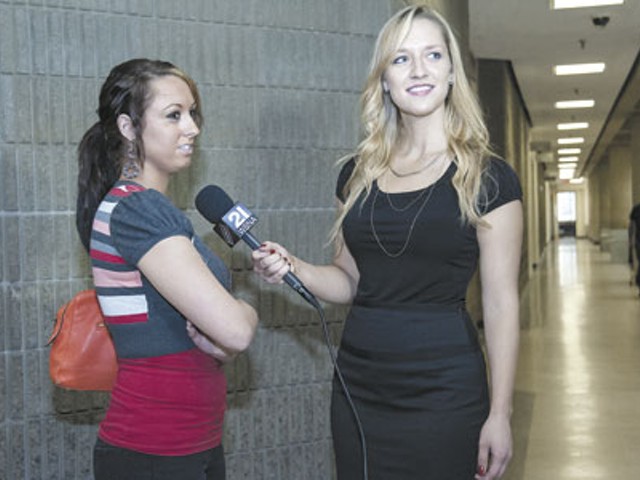LEO Weekly welcomes letters that are brief (350 words max) and thoughtful. Ad hominem attacks will be ignored, and we need your name and a daytime phone number. Send snail mail to Inbox, 301 E. Main St., Suite 201, Louisville, Ky. 40202. Fax to 895-9779 or email to [email protected]. We may edit for length, grammar and clarity.
Shakespeare
I am also excited to see “Love’s Labour’s Lost” at Actors Theatre, but I had a strong reaction to much of your language in the Staff Pick. The comment about your joy/relief that someone is doing a Shakespeare play other than Midsummer or Romeo and Juliet betrays a blind eye to many recent happenings in local theatre.
The Kentucky Shakespeare Festival this past summer received much critical acclaim, including several favorable reviews from the LEO. One of the plays produced, performed by the company’s student troupe and expertly directed by Brian Hinds, was “Love’s Labour’s Lost.”
In addition, Savage Rose Classical Theatre Company right here in Louisville, produces a full season of classical works, always including at least three Shakespeare productions. Every season.
So if you’re hungry for Shakespeare that’s not those two classics you mentioned, I would suggest that you needn’t wait for Actors Theatre’s every-two-years offering, but look around the city and see what else there is to see.
Amy Attaway, Germantown
Anti-Union
Interesting how David Hawpe [Aug. 27 Cover Story] felt powerful, when while working a summer job, his union shut down the Viceroy production line at Brown & Williamson Tobacco because he struggled but could not keep up on the line. A few years after David’s star-crossed employment at B&W, I was hired at B&W as Director of Media. It was my job to spend about $80,000,000 per year advertising Viceroy, Kool, and many other B&W brands of cigarettes. It would never have occurred to me that it would be a good idea to stop production of the product my company manufactured, and incidentally the company that paid my salary.
I too, in high school, had a job where I had to keep up with a production line. I had to supply punch press operators with pieces of metal that they put onto the presses. The operators were paid piece work, not hourly. If I let their bins run empty they didn’t make any money. That entire summer, I dared not let any of their bins run empty. Like David, I also came from a union family. On the night before my one and only union job, as a summer replacement truck driver, my father took me aside and told me not to hustle too much because it would make the regular drivers look bad.
I bring this up to point out differences in attitudes toward labor. The beef against unions is that they are adversarial, have no loyalty to their employers, and will bite the hand that feeds them.
Ralph Koslik, Highlands
Job well done
As a first time reader of Leo Weekly, I was amazed by the quality of your articles and content, especially the article by David Hawpe and the Guest Commentary articles by Dr. MacFarlane and U.S. Rep. John Yarmuth and commend you for them [Aug. 27 Issue]. As a Ludwig von Mises economic advocate, I have to agree with Michael MacFarlane’s thinking if we had a free market, but we don’t and therefore, from an enlightened public policy perspective, we need the protections advocated by a more thoughtful experienced leader such as John Yarmuth, in my opinion. Finally, I was most impressed with the historical names and recital of events by David Hawpe. Congratulations on your excellent articles!
James Marquart, Clarksville, Ind.
On minimum wage
You can’t make a business hire people at $15 an hour, you can only mandate that, if they do hire people, they are paid $15 an hour. Which means that only those people whose work produces at least $15 an hour in revenue will be hired. This would be bad news for inexperienced, first-time job-seekers, whose work will not always be worth that much.
Mr. Louderback [Sept. 3 Letter to the Editor] has surely foregone purchasing something in his life because it was too expensive. Why are we to think employers won’t do the same?
The Bureau of Labor Statistics has an interesting breakdown of wage workers for 2011 (http://www.bls.gov/opub/ted/2012/ted_20120306_data.htm): 5.2% of all hourly workers got minimum wage or less; 22.8% of hourly workers between 16 and 19 got minimum wage; 9.5% of hourly workers between 20 and 24 got minimum wage; and just 3.2% of workers older than 24 were paid minimum wage. Only 2.4% of full-time workers made minimum wage.
Finally, consider this: if $15 an hour is better than $7.25, wouldn’t $1500 an hour be even better? If not, why not?
Rich Mills, Shawnee





